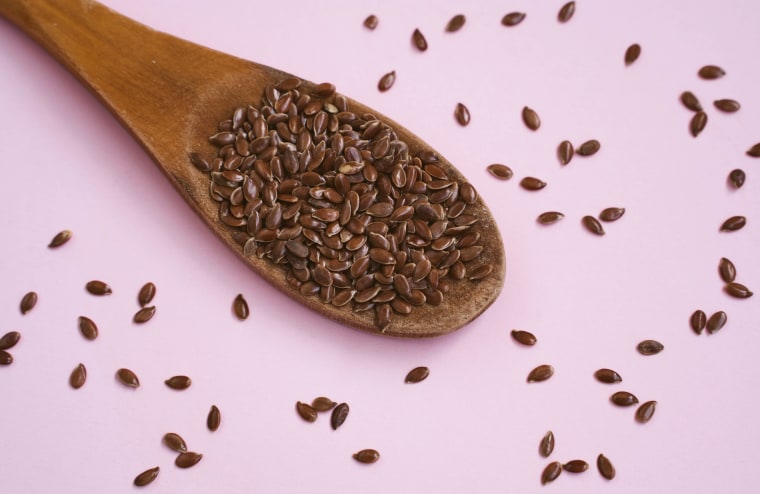Welcome to Start TODAY. Sign up for our Start TODAY newsletter to receive daily inspiration sent to your inbox — and join us on Instagram!
You may have noticed that flaxseeds are getting more attention lately. You can thank TikTok for shining the light on the mighty seed. Users have been making claims that flaxseed gel applied to the face is “the same as Botox” (more on that later).
But social media trends aside, flaxseeds have long been a food that dietitians encourage as a part of a healthy diet. And whether or not there is merit to the latest buzzy trend, there are many reasons why they should be part of your daily diet.
For one, the tiny seeds pack many beneficial nutrients into a small package. With healthy fats, protein, fiber, vitamins and minerals, flaxseeds serve up a ton of health benefits. They also contain an estrogen-like compound, called lignans, that positively influence female hormones. Plus, flaxseeds add a nutty and crunchy flavor to any meal, with a bonus boost of nutrition.
Learn the nutrition facts of flaxseeds, the health benefits of eating these small but mighty seeds and simple ways to include them in your diet.
Flaxseed nutrition facts
Two tablespoons of flaxseed (the recommended serving size on most packages) contains:
- 110 calories
- 4 grams protein
- 9 grams fat
- 6 gram carbohydrates
- 6 grams fiber (21% daily value (DV))
- 80 milligrams magnesium (19% DV)
- 6 ug selenium (11% DV)
- 0.4 milligrams thiamin (33% DV)
Flaxseed benefits
Flaxseeds are tiny, but the nutrition profile is robust. A 2019 review states that the “good” unsaturated omega-3 fats in flaxseeds act as an antioxidant and are the reason for the healthfulness of the seeds. The most promising research is in the areas of cardiovascular disease and cancer management.
Specifically, a meta-analysis of over 30 studies found that supplementing the diet with various flaxseed products is an effective way to lower both diastolic and systolic blood pressure, which reduces the risk of cardiovascular disease. Another study had people with high cholesterol or high triglycerides supplement with 30 grams (about ¼ cup) of flaxseed powder for 3 months. At the end of the 3-month period, the participants had lower LDL (bad) cholesterol levels, lower triglycerides and higher HDL (good) cholesterol. The authors attribute these results to the healthy fats in flaxseeds, as well as dietary lignans, a class of phytoestrogens (plant-based estrogen-like compounds) that have antioxidant properties.
Since flaxseeds play a role in fighting inflammation, they have been examined in cancer research. Animal studies suggest that omega-3s may suppress growth, size and expansion of cancer cells. In addition, the lignans in flaxseeds may influence breast cancer therapy. Lignans have a very similar chemical structure to an estrogen molecule. Some breast cancers contain estrogen receptors, and the lignans from flaxseeds bind to those receptors, decreasing cancer cell growth.
Lastly, the fiber in the flaxseeds may contribute to digestive health, such as treating constipation and creating a healthy and diverse microbiome. Fiber also helps to stabilize blood-sugar levels, which is important for those with diabetes.
Is flaxseed good for weight loss?
Foods that are rich in fiber, protein and healthy fats, like flaxseeds, contribute to satiety and regulate hunger, making them good for weight loss. A meta-analysis of 45 studies cites that eating flaxseeds as part of a healthy diet may decrease body weight and waist size. The research also suggests that consuming more than 30 grams (¼ cup) for longer than 12 weeks positively impacts body composition.
Does flaxseed reduce belly fat?
It’s a common nutrition myth that any one food can reduce belly fat. As a matter of fact, it’s impossible to target fat loss to a certain area of the body. When you lose weight, you may see size reductions in multiple areas of the body, including your belly, legs, chest or arms. While flaxseeds may contribute to weight loss, they won’t magically melt away belly fat.
How much flaxseed a day is ideal?
There isn’t a standard serving size for flaxseeds, although most packages recommend 2 to 3 tablespoons (about 1 ounce) per serving. The USDA counts ½-ounce of seeds as a 1-ounce equivalent of protein (most people need at least 5-6 ounces per day).
Should flaxseed be eaten in the morning or night?
There isn’t any research on the best time of day to eat flaxseeds, so incorporate them into your diet whenever you like. The best time to eat them is a time that works for you! Many people like to sprinkle them into their morning oatmeal or smoothie or lunchtime salad or grain bowl.
Who should not eat flaxseeds?
Flaxseeds are safe for most healthy people. Because of their high fiber content, eating too much of them may cause gas and bloating. If you’re concerned about this, stick to the 2 to 3 tablespoon recommendation.
Although the lignans in flaxseeds have been shown to be beneficial for women’s health, some people with breast cancer or other hormonal conditions may worry about eating flaxseeds. If that’s the case, talk to your doctor about including them in your diet.
Is there any benefit to using flaxseeds in your skincare routine?
You may have seen the claims on TikTok that a flaxseed water gel is “the same as Botox.” Flaxseeds contain healthy fats and vitamin E, two nutrients that are beneficial to skin when ingested. That said, applying flaxseed to your face isn’t the same as eating it and it certainly isn’t the same as Botox. If you want to reap the skin benefits of flaxseeds, add them to your diet.
Healthy flaxseed recipes
From smoothies to baked goods to granola, there are multiple ways to eat more flaxseeds. Here are some of our favorite recipes:




